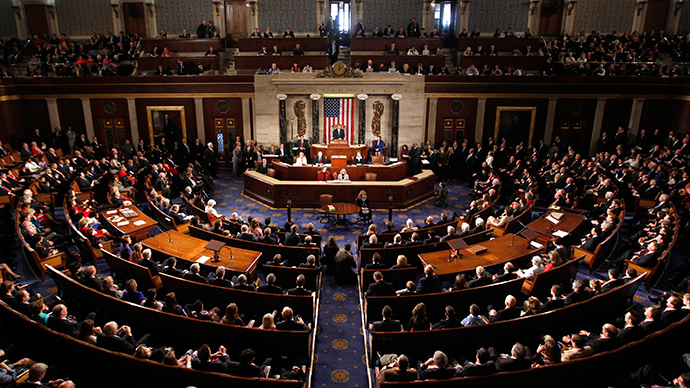House votes to avoid govt shutdown, passes $1trn spending bill

The House of Representatives voted to pass a massive spending bill that will keep the government running into next year, narrowly avoiding a shutdown as Republicans and Democrats spent the night at odds over various provisions.
Next, the Senate will vote on the bill – the so-called “cromnibus” – which is part continuing resolution and part omnibus spending bill. If approved by the chamber, it will head to President Barack Obama’s desk for his signature. Obama previously said he would support the bill’s passage.
Following a day of intense debate over immigration reform and provisions that roll back some regulations in the Dodd-Frank Wall Street reform act, the Republican-led House passed the $1.1 trillion bill by a vote of 219-206.
“This plan was put together after consultation with our members,” House Speaker John Boehner (R-Ohio) said Thursday. “And we worked through this process in a bipartisan, bicameral way.”
Initially, some Republicans withheld crucial support over the fact that the bill continues to fund the Department of Homeland Security, which is primarily responsible for implementing Obama's executive order that could shield up to five million undocumented immigrants from deportation. Some conservatives believed Republicans should risk shutting down the government to confront the president.
That funding expires in February, however, meaning a battle over the president's immigration action looms in the coming months.
Meanwhile, Democrats balked at providing the necessary votes to pass the bill, knowing that it would cut Wall Street reforms restricting derivatives trading to bank accounts that are not insured by the Federal Deposit Insurance Corporation (FDIC). This type of risky trading played a key role in the 2008 financial collapse.
Upon hearing that these provisions were inserted, leading Democratic lawmakers fiercely criticized the bill and pushed party members to vote against it. Minority Leader Nancy Pelosi (D-Calif.) said liberals were being "blackmailed" into voting for the measure simply to keep the government running.
Sen. Elizabeth Warren (D-Mass.) also urged Democrats to oppose the bill, saying, "This is a democracy and the American people didn't elect us to stand up for Citigroup."
While the White House objected to eliminating the regulation, it nevertheless whipped support for the bill.
In addition to funding the government, the bill provides a significant infusion of cash to the Centers for Disease Control and Prevention, as well as America's effort to combat Ebola. The CDC saw its budget increase by nearly $43 million to roughly $6.9 billion. Another $5.4 billion is set aside specifically to fight the spread of Ebola domestically and overseas.
The bill also bans the District of Columbia from legalizing marijuana for the majority of 2015, despite a ballot initiative that easily passed during the midterms, permitting recreational use of the drug.
Among other things, the bill beefs up security at American embassies and boosts funding for the Food and Drug Administration. The administration's efforts to close the Guantanamo Bay prison complex in Cuba, however, were denied once again, as lawmakers refused to allow the White House to transfer detainees inside of the country.












